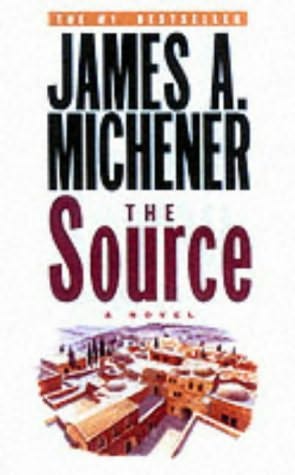every once in a while something hits you that changes your life….
I was 12 years old when I first read The Source by James Michener.
Growing up, my household was not exactly a font of great literature. My old man had a marked proclivity for coming home and falling asleep in front of the TV set. But The Source was one book that made it into our house, and it was probably the first ‘big book’ that I read.
The novel, much in keeping with the classic ‘Michener’ style, is an epic account of the epic story of Israel, starting with the very first settlements long ago in ancient Palestine, and then running through nearly 5000 years in about 500 pages.
Michener’s vehicle is the story of an archaeological dig on fictional Tel Makkor.
Reading the book captured me on many levels. So much so that I read parts of it over and over again. Some images stayed with me for a lifetime.
Ten years after first discovering and devouring the book, I found myself working on an archaeological excavation – Tel Anafa in northern Israel. I would subsequently spend the next 8 seasons digging in Israel and Cyprus.
When you excavate a site, you pass through strata or levels of past civilizations – one on top of the other, just as Michener had laid out – Arab, Turkish Byzantine, Crusader, Caliphate, Roman, Greek… all the way to neolithic, if you get lucky. City built on top of city built on top of city. A history of living civilization, battles fought, lives lived emerges as you work your way downward. It is a captivating experience. There are times when you have cleared a courtyard in a Roman home that has not seen the light of day for 2000 years, and you reach down and pick up a potsherd – a piece of broken pottery that was someone’s dinner plate and hold it in your hands. It is truly remarkable.
Years later, when I had gotten into the television business, one of the very first shows I pitched to Discovery was a show about archaeology. This was a long time ago.
The head of the channel listend to my pitch, then he said to me “do you have any ‘lost cities of death? Or maybe haunted ancient ruins? That we would be interested in’.
Well, of course, he wanted ratings.
But the search for ‘exciting’ television all the time is a kind of never ending pornography. And you have to keep upping the ‘excitement level’ to continually hold the audience. In truth, had Michener’s book been about ‘lost cities of death’, it probably would not have had the intense power that The Source had for me.
What made the book so compelling was the deep and factual nature of the content. No need for ‘lost cities of death’.
Can we create television that contains the same narrative power without resorting to the cheese?
Something really powerful and important has been lost here. I wonder if there is a way to recapture it.

1 Comment
Dushan July 15, 2007
Thanks for the booktip, Michael. I amazoned it right away!